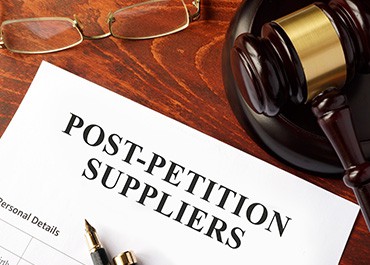![Has the Second Circuit Extended the Automatic Stay. . . Again[1][2]](https://www.bankruptcystrategies.com/wp-content/uploads/2024/02/Has-the-Second-Circuit-Extended-the-Automatic-Stay.jpg)
The Bankruptcy Code’s “Automatic Stay”[3] is its “fundamental” protection.”[4] In summary, it enjoins efforts to prosecute claims against debtors or gain possession or control the bankruptcy estate’s[5] property.The Automatic Stay: a.) offers debtors “breathing room” during the period of financial Read More
![A LEG UP FOR EQUITY? Part II – Freeze Claims [1]](https://www.bankruptcystrategies.com/wp-content/uploads/2024/02/A-LEG-UP-FOR-EQUITY-Part-II-–-Freeze-Claims.jpg)
Equity security holders[2] or investors [3] (“Equity Holders”) in debtor entities are usually subordinated to creditors’ claims in bankruptcy cases.[4] This need not always be so. Read More
![A LEG UP FOR EQUITY? Part I – Fraudulent Retention Claims<sup>[1]</sup>](https://www.bankruptcystrategies.com/wp-content/uploads/2024/02/A-LEG-UP-FOR-EQUITY-Part-I-–-Fraudulent-Retention-Claims.jpg)
Equity security holders[2] or investors [3] (“Equity Holders”) in debtor entities are usually subordinated to creditors’ claims in bankruptcy cases.[4] This need not always be the case. Two conditions exist where Equity Holders’ claims may be equal or superior to general unsecured creditors’ claims. The first are claims based on “fraudulent retention” (“Fraudulent Retention Claims”). The second are claims based on debtors’ post-petition interfering with Equity Holder’s rights to sell their investment, to benefit the debtors’ reorganization effort (“Freeze Claims”). Read More
The ability to “clawback”[2] fraudulent transfers is an ancient,[3] but reliable, tool in bankruptcy trustees’ armories. Fraudulent transfers have two classes: a.) intentional; and b.) constructive. Intentional fraudulent transfers are “yes, I intended to hinder, delay and/or defraud my creditors.” Constructive fraudulent transfers don’t involve intent. Instead, they are transfers where the circumstances cloud the transfers’ economic bona fides (eg. “Jack, you traded the cow for some beans. Are you mashugah[4]? Go to your room! My creditors will go nuts.”). It doesn’t mean you’re a fraud; just not the best…Read More
Bankruptcy cases frequently have transfers of the bankruptcy estate’s property through court- approved sales.[2] Sometimes those sales are challenged.[3] Often those challenges are overruled.[4] Sometimes the order approving the sale is appealed...Read More

Individual chapter 11 reorganization cases often play a role in Entrepreneur Rescue.[1] The Small Business Reorganization Act of 2019 (the “SBRA”) vitalized the process with Subchapter V. Subchapter V provides an expedited, simpler and less expensive route through chapter 11 of the Bankruptcy Code for small businesses and their owners.[2] As we’re often quoted, properly timing any bankruptcy case is essential. Poor timing can result in lost opportunities and higher risks. Properly timing a Subchapter V case is also essential. Mis-timing a Subchapter V case in the Entrepreneur Rescue process… Read More

The Small Business Reorganization Act of 2019 (the “SBRA”) provides an expedited, simpler and less expensive route through chapter 11 of the Bankruptcy Code for small businesses. Plus, it preserves the owners’ equity interest in their company; even without paying creditors what they are owed. Initially, to qualify as a small business the debtor could have no more than $2,725,625 of debt. Responding to the Coronavirus Pandemic, Congress passed the CARES Act. The CARES Act recognized the SBRA’s debt cap was unrealistic. So, the CARES Act increased the cap to… Read More

When I was in the fourth grade, our teacher Mrs.[1] Weiner, taught us to be “good citizens.” She did not teach us to be “patriots.” Good citizens: voted, didn’t litter, stay home when sick, didn’t violate the law, stayed informed, looked out for their neighbors and acted consistently with FDR’s “Four Freedoms.[2]” Unfortunately, some folks, who see themselves as patriots, are not good citizens. They decided that their individual privileges include not wearing a mask in public during our Covid-19 pandemic. They raise their individual “right[3]” above the needs of… Read More

In a recent mega-retail case, our client had outstanding, pre-petition purchase orders (“POs”) for goods the debtor wanted delivered. It’s true that post petition suppliers have an administrative priority to get paid. However, that priority is meaningful only if there is cash available for payment. In this, as in most cases, lenders had liens on all of the debtor’s assets. The debtor got authority to use the banks’ cash collateral, subject to a budget. However, the budget did not disclose whose sales got paid. It was possible, if the reorganization… Read More

Involuntary bankruptcy cases are where creditors file a petition to put a debtor into bankruptcy. They can be filed against individuals, as well as entities. When people think of an involuntary bankruptcy petition against an individual, celebrities and the fallen “well to do” come to mind. People don’t think of their neighbor, who defaulted their first or second mortgage a year or two ago. The Covid-19 pandemic has seen states restricting foreclosure actions. This is frustrating mortgagees holding mortgages where the debt exceeds the property’s value. So, they are using… Read More

